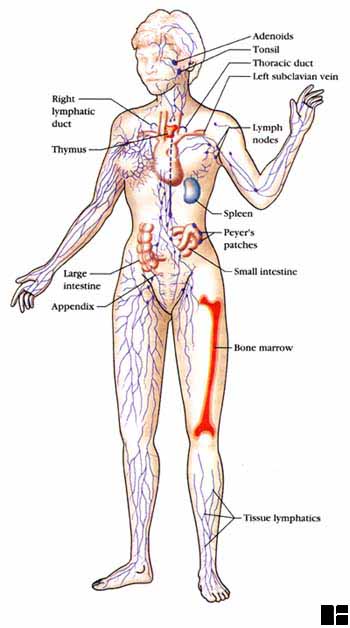Cancer: shock breakthrough 

June 21, 2009
Prostate cancer victims cured with ipilimumab
Daniel Foggo
.
Comment from a reader:
( This drug is now being tested on skin cancer, Hodgkin's and lung cancer as well.
If successful on all, then its impact may well be universal on all cancers. )
. .
.
Prostate cancer victims cured with ipilimumab
Daniel Foggo
.
Comment from a reader:
( This drug is now being tested on skin cancer, Hodgkin's and lung cancer as well.
If successful on all, then its impact may well be universal on all cancers. )
. .
.
TWO men with advanced, inoperable prostate cancer
have dramatically recovered after being treated with an experimental drug.
Both are cancer-free and have returned to normal life.
The patients, Rodger Nelson and Fructuoso Solano-Revuelta,
took part in US trials of a drug called ipilimumab.
The researchers were so excited by the men’s recovery
that they released details before completion of the tests,
which involved 108 men in all.
Before treatment at the Mayo Clinic, Minnesota,
both men had aggressive tumours and neither was expected to survive.
Dr Eugene Kwon, who led the trial, said:
“We were startled to see responses that far exceeded expectations.”
The patients received traditional hormone therapy
to remove testosterone, which fuels prostate cancer.
They then had one dose of ipilimumab,
an antibody that boosts the immune system’s response.
have dramatically recovered after being treated with an experimental drug.
Both are cancer-free and have returned to normal life.
The patients, Rodger Nelson and Fructuoso Solano-Revuelta,
took part in US trials of a drug called ipilimumab.
The researchers were so excited by the men’s recovery
that they released details before completion of the tests,
which involved 108 men in all.
Before treatment at the Mayo Clinic, Minnesota,
both men had aggressive tumours and neither was expected to survive.
Dr Eugene Kwon, who led the trial, said:
“We were startled to see responses that far exceeded expectations.”
The patients received traditional hormone therapy
to remove testosterone, which fuels prostate cancer.
They then had one dose of ipilimumab,
an antibody that boosts the immune system’s response.

Both patients saw their prostate specific antigen
(PSA) levels drop to the point where they could have surgery.
PSA is a protein that allows doctors to monitor prostate cancer.
When the surgeons made their incisions, they had a surprise.
Michael Blute, a urologist, said: “The tumours had shrunk dramatically.
I had a hard time finding the cancer.”

John Neate, of the Prostate Cancer Charity in the UK,
where 10,000 men die a year from the disease, said:
“If these early and small-scale results are replicated in larger trials,
this represents a potentially very exciting development.”
From Times Online

. .
.
Patients with inoperable prostate disease recover after single dose of drug
By Jeremy Laurance, Health editor Saturday, 20 June 2009
.
Patients with inoperable prostate disease recover after single dose of drug
By Jeremy Laurance, Health editor Saturday, 20 June 2009
The results were so startling that researchers decided to release details
of the two cases before the drug trial – in which the patients took part – was complete.
Doctors said their progress had exceeded all expectations.
The men were treated at the Mayo Clinic in Minnesota in the US,
one of the top medical centres in the world.
Dr Eugene Kwon, the urologist who was in charge of their treatment,
compared the results to the first pilot breaking the sound barrier.
"This is one of the Holy Grails of prostate cancer research.
We have been looking for this for years," he said.

Prostate cancer is the most common cancer in men
– 34,000 new cases and more than 10,000 deaths are reported each year in Britain,
where rates of its occurrence have tripled in the past 30 years,
mainly due to improved detection. The US has the highest incidence of the disease.
Rodger Nelson and Fructuoso Solano-Revuelta were diagnosed
with advanced prostate cancer and sought treatment at the Mayo Clinic.
They were told the disease had spread beyond the prostate.
Mr Nelson's cancer was encroaching on the abdomen
and Mr Solano-Revuelta's tumour was the size of a golf ball.
Patients in such condition are told they may have only months to live,
and are normally only offered palliative care.
But after one infusion of the drug ipilimumab,
a monoclonal antibody that stimulates the immune system,
given with conventional hormone therapy,
their tumours shrank enough to be surgically removed.
Both men have since made a full recovery and returned to their businesses.
*snip*
– 34,000 new cases and more than 10,000 deaths are reported each year in Britain,
where rates of its occurrence have tripled in the past 30 years,
mainly due to improved detection. The US has the highest incidence of the disease.
Rodger Nelson and Fructuoso Solano-Revuelta were diagnosed
with advanced prostate cancer and sought treatment at the Mayo Clinic.
They were told the disease had spread beyond the prostate.
Mr Nelson's cancer was encroaching on the abdomen
and Mr Solano-Revuelta's tumour was the size of a golf ball.
Patients in such condition are told they may have only months to live,
and are normally only offered palliative care.
But after one infusion of the drug ipilimumab,
a monoclonal antibody that stimulates the immune system,
given with conventional hormone therapy,
their tumours shrank enough to be surgically removed.
Both men have since made a full recovery and returned to their businesses.
*snip*

Professor Malcolm Mason, a Cancer Research UK prostate cancer specialist, said:
"These case reports are extremely interesting and encouraging.
Ipilimumab might potentially be a strong stimulator of the immune system,
and it seems logical that it might also be effective in prostate cancer. //
*snip*

Ipilimumab: How it works
*Ipilimumab is one of a class of drugs called monoclonal antibodies,
which stimulate the body's own immune system to fight disease.
The experimental treatment is being developed
by Bristol-Myers Squibb and Medarex, a US biotech company.
The drug is being trialled on malignant melanoma, the most serious form of skin cancer,
Hodgkin's disease, lung cancer and prostate cancer.
Studies are most advanced in melanoma, where it has been shown to prolong survival
in patients with advanced forms of the disease.
In the Mayo Clinic study of prostate cancer,
researchers say that standard hormone treatment ignited the immune response,
and adding ipilimumab was like "pouring gasoline on the pilot light".
Read the full article in The Independent
.
. .

Comment
Trackback


